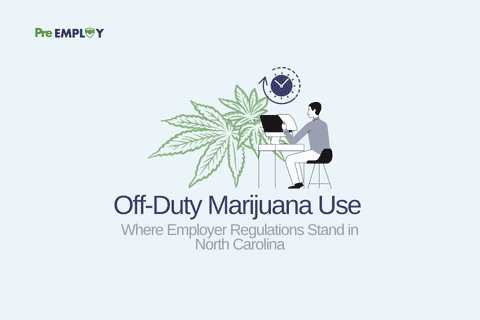Where Employer Regulations of Off-Duty Marijuana Use Stand in North Carolina

December 6, 2022
Cannabis has continued to gain legal status across the country and, with it, a variety of employment protections. Currently, 24 states have fully legalized marijuana, many of which have made it illegal for employers to discriminate against applicants and employees who use it. North Carolina does not count itself among these states, but its “lawful use of lawful products law” has created some confusion for employers.
N.C. Gen. Stat. § 95-28.2, or the lawful use of lawful products law, is one of the country’s most contested and misunderstood. It has now gained renewed relevance due to the growing use of marijuana. Employers are familiar with federal and state discrimination laws, which forbid discrimination based on a person’s characteristics (i.e. race, national origin, religion, or disabilities)—however, Gen. Stat. § 95-28.2 has proven different from these familiar regulations.
For example, Gen. Stat. § 95-28.2 states that it protects an applicant or employee’s right to lawfully use lawful products free from adverse employment-related actions by public and private employers of three or more workers. Specifically under the law:
It is an unlawful employment practice for an employer to fail or refuse to hire a prospective employee, discharge, or otherwise discriminate against any employee concerning compensation, terms, conditions, or privileges of employment. This practice explicitly targets prospective employees or the employees engaging or who have engaged in the lawful use of lawful products off the employer’s premises during non-working hours. In addition, discrimination cannot target legal usage when it does not adversely affect the employee’s job performance or the person’s ability to properly fulfill the responsibilities of the position in question or the safety of other employees.
Though recreational marijuana use remains illegal, changes in the law mean that the use of hemp and hemp-derived cannabidiol (CBD) products is legal. These products can contain small quantities of tetrahydrocannabinol (THC), the psychoactive component of marijuana. This usage can result in a positive employment-related drug test.
Despite this, CBD and other hemp-derived products are considered lawful products. In turn, this means that the presence of THC in a drug test does not guarantee that an employee used an unlawful product, such as recreational marijuana, outside the workplace. Further complicating matters is the increasing number of counties and localities that have changed their regulations and enforcement regarding cannabis products. This complication creates confusion about how to address cannabis usage; however, Gen. Stat. § 95-28.2 also provides employers some protections.
Employers may still restrict the lawful use of products outside of working hours if the restriction is related to a fundamental objective. For example, an organization devoted to preventing substance abuse would have the right to restrict the lawful use of products. Other examples include whether the restriction is a bona fide occupational requirement or affects employment activities. In addition, a permitted restriction may apply if the usage would adversely affect the employee’s performance, ability to perform their role, or the safety of other employees.
In light of the changes regarding the use and legal status of THC and hemp-derived products, employers should consider reviewing their policies. In addition, employers should discuss their policies with qualified legal counsel to ensure that they comply with the latest regulations.
Looking to easily verify your employment qualifications? Talk to a sales representative today about switching to pre-employment background checks.
